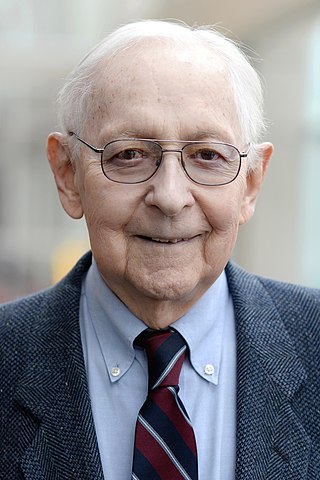Computer science is the study of the theoretical foundations of information and computation and their implementation and application in computer systems. One well known subject classification system for computer science is the ACM Computing Classification System devised by the Association for Computing Machinery.
Theoretical computer science (TCS) is a subset of general computer science and mathematics that focuses on mathematical aspects of computer science such as the theory of computation (TOC), formal language theory, the lambda calculus and type theory.
In mathematics and computer science, the Krohn–Rhodes theory is an approach to the study of finite semigroups and automata that seeks to decompose them in terms of elementary components. These components correspond to finite aperiodic semigroups and finite simple groups that are combined in a feedback-free manner.

The European Association for Theoretical Computer Science (EATCS) is an international organization with a European focus, founded in 1972. Its aim is to facilitate the exchange of ideas and results among theoretical computer scientists as well as to stimulate cooperation between the theoretical and the practical community in computer science.
ICALP, the International Colloquium on Automata, Languages, and Programming is an academic conference organized annually by the European Association for Theoretical Computer Science and held in different locations around Europe. Like most theoretical computer science conferences its contributions are strongly peer-reviewed. The articles have appeared in proceedings published by Springer in their Lecture Notes in Computer Science, but beginning in 2016 they are instead published by the Leibniz International Proceedings in Informatics.

Arto Kustaa Salomaa is a Finnish mathematician and computer scientist. His research career, which spans over forty years, is focused on formal languages and automata theory.
DLT, the International Conference on Developments in Language Theory is an academic conference in the field of computer science held annually under the auspices of the European Association for Theoretical Computer Science. Like most theoretical computer science conferences its contributions are strongly peer-reviewed; the articles appear in proceedings published in Springer Lecture Notes in Computer Science. Extended versions of selected papers of each year's conference appear in international journals, such as Theoretical Computer Science and International Journal of Foundations of Computer Science.
DCFS, the International Workshop on Descriptional Complexity of Formal Systems is an annual academic conference in the field of computer science.
Michael Stewart Paterson, is a British computer scientist, who was the director of the Centre for Discrete Mathematics and its Applications (DIMAP) at the University of Warwick until 2007, and chair of the department of computer science in 2005.
Michael Ralph Fellows AC HFRSNZ MAE is a computer scientist and the Elite Professor of Computer Science in the Department of Informatics at the University of Bergen, Norway as of January 2016.

Janusz (John) Antoni Brzozowski was a Polish-Canadian computer scientist and Distinguished Professor Emeritus at the University of Waterloo's David R. Cheriton School of Computer Science.

Grzegorz Rozenberg is a Polish and Dutch computer scientist.
Hans-Jörg Kreowski is a professor for computer science at the University of Bremen in North West Germany. His primary research area is theoretical computer science with an emphasis on graph transformation, algebraic specification, and syntactic picture processing. He is also a member of the Forum of Computer Scientists for Peace and Social Responsibility (FIfF).
ACM SIGLOG or SIGLOG is the Association for Computing Machinery Special Interest Group on Logic and Computation. It publishes a news magazine, and has the annual ACM-IEEE Symposium on Logic in Computer Science (LICS) as its flagship conference. In addition, it publishes an online newsletter, the SIGLOG Monthly Bulletin, and "maintains close ties" with the related academic journal ACM Transactions on Computational Logic.

Kai Tapani Salomaa is a Finnish Canadian theoretical computer scientist, known for his numerous contributions to the state complexity of finite automata. His highly cited 1994 joint paper with Yu and Zhuang laid the foundations of the area. He has published over 100 papers in scientific journals on various subjects in formal language theory. Salomaa is a full professor at Queen's University.
State complexity is an area of theoretical computer science dealing with the size of abstract automata, such as different kinds of finite automata. The classical result in the area is that simulating an -state nondeterministic finite automaton by a deterministic finite automaton requires exactly states in the worst case.
Jean-Éric Pin is a French mathematician and theoretical computer scientist known for his contributions to the algebraic automata theory and semigroup theory. He is a CNRS research director.
Derick Wood (1940–2010) was an English computer scientist who worked for many years as a professor of computer science in Canada and Hong Kong. He was known for his research in automata theory and formal languages, much of which he published in collaboration with Hermann Maurer and Arto Salomaa, and also for his work in computational geometry.




